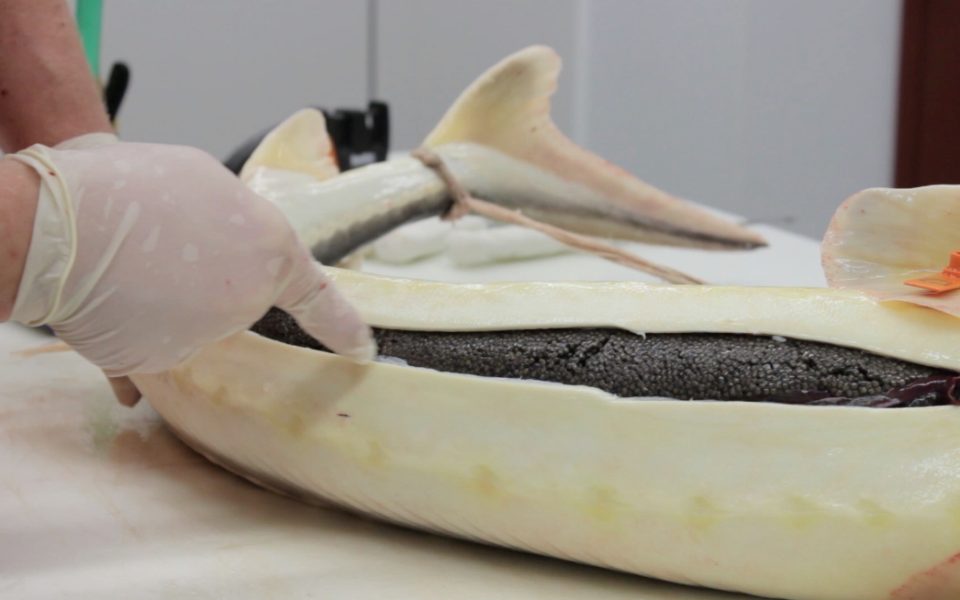Brian Gersten’s never really understood the allure of caviar and why people are willing to pay so much for the delicacy. After spending two years producing a short film about the revered fish eggs — talking to experts, visiting a growing and harvesting operation in western North Carolina and trying caviar for the first time — he isn’t any closer to an answer.
Gersten and Wake Forest University classmates Liv Dubendorf and Wei Ying are putting the final touches on their short film, “Caviar Dreams,” raising money on Kickstarter for final sound mixing, color correction and particularly archival licensing fees. But the short’s already been accepted to the Sonoma International Film Festival, and it’s likely that California screening won’t be their only festival appearance.
The trio found themselves working together on the piece as part of an assignment for Wake’s three-year graduate film program, Gersten said. It wasn’t the first idea he’d come up with, and it evolved considerably from the outset. But knowing his history, it isn’t that surprising that the Chicago transplant ended up working on a film about caviar, despite a lack of personal reverence.
Gersten had been working as a writer before being accepted into grad school, writing copy for marketing and advertising as well as nonfiction for magazines. Upon acceptance, he quit his “soul crushing” marketing gig and sought temporary work until relocating to Winston-Salem. He wound up as a fish cutter at Dirk’s Fish & Gourmet Shop, a venue that appears in “Caviar Dreams” as the location of a tasting for the fine food.
But during his short tenure at Dirk’s, Gersten didn’t try any caviar. It sparked some interest though, and after finding Atlantic Caviar & Sturgeon farm about 90 minutes west of Wake Forest University, outside of Lenoir, Gersten and his classmates set to work.
The film, which runs about 14 minutes long, explores why the black fish eggs harvested from sturgeons — a type of fish that Atlantic Caviar farmer Jeff Hinshaw describes as “swimming dinosaurs” in the film — rose to prominence and gained such popularity. (Similar to champagne, caviar is a term reserved for sturgeon eggs, while other fish eggs must be called simply that, or roe.)
“Caviar Dreams” – Teaser from Brian Gersten on Vimeo.
“Caviar Dreams” relies on experts, connoisseurs, farmers and archival footage to illustrate the product one person calls more valuable by weight than cocaine. It’s engaging, with shots ranging from a sturgeon being cut open to reveal thousands of little black beads to footage of kids sampling and responding to the fishy food’s taste.
But the short also explores the ethical implications of such a commodified and overfished product. As Philadelphia-based caviar historian Inga Saffron puts it: “We think we can eat anything at any time of the year, and that it will have no consequences.”
The film ends with several entertaining archival clips as the credits roll, including a strange segment showing two women in an inflatable pool full of the black gold and another from ABC News reporting on the young Barron Trump using his mother’s “enhanced caviar skincare line,” which the new first lady reportedly said she applied to him “from head to toe.”
Gersten didn’t grow up that way, and neither did Dubendorf and Ying. He first tried caviar at the North Carolina fish farm, somewhat ironically based in the mountains. It’s not that he doesn’t like it, but if he had the money, it’s clear he’d spend it elsewhere. There’s no sense of contempt or resentment that comes through in the film or his voice, however, just genuine intrigue.

©
Dubendorf — who previously worked in reality television — handled most of the audio for the project, Wei tackled the bulk of the editing and Gersten focused on the camera, he said, adding that their existing skills complemented each other nicely.
It’s the second film Dubendorf and Gersten collaborated on, the first about a competitive yodeling/yelling competition held each year in the state. That project made it into a bunch of film festivals and pulled in several awards, Gersten said. They’re no doubt hoping for similar success this time around.
Dubendorf and Gersten arrived at Wake Forest University with some credits, allowing them to graduate this past December though they’re part of Ying’s class that finishes up in May. Their study of this luxury food is the biggest accomplishment of their time in the film program, and Gersten said it’s very likely “Caviar Dreams” will appear on a local screen before too long.
Given his past success and the quality of the short, that sounds likely and would certainly be welcome.
Join the First Amendment Society, a membership that goes directly to funding TCB‘s newsroom.
We believe that reporting can save the world.
The TCB First Amendment Society recognizes the vital role of a free, unfettered press with a bundling of local experiences designed to build community, and unique engagements with our newsroom that will help you understand, and shape, local journalism’s critical role in uplifting the people in our cities.
All revenue goes directly into the newsroom as reporters’ salaries and freelance commissions.


Leave a Reply